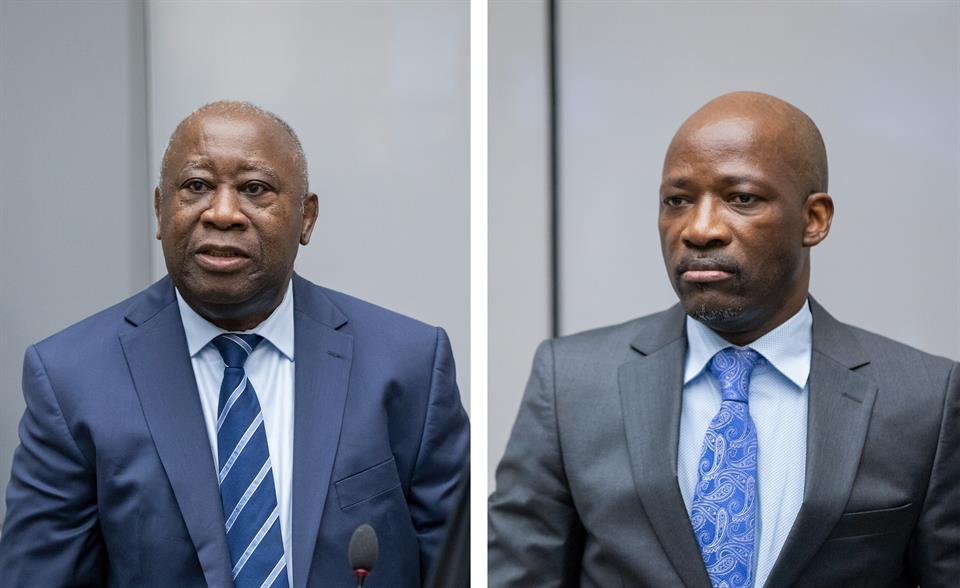The International Criminal Court (ICC) in The Hague has acquitted Ivory Coast ex-President Laurent Gbagbo. A victory that should be applauded by all Africans because he was wrongly accused and prosecuted.
Gbagbo was the first former head of state to go on trial at the ICC and had been charged with crimes against humanity in connection with violence following a disputed 2010 election that is said to have left 3,000 dead and 500,000 displaced. He was humiliatingly captured in 2011 in a presidential palace bunker by UN and French-backed forces supporting his rival, Alassane Ouattara whom they had competed together in an election process, that caused a political stand-off, there were bloody clashes and alleged targeted killings in Abidjan in the south, and several hundred are said to have been massacred in the western town of Duekoue.
Gbagbo`s trial at the International Criminal Court in The Hague began on 28 January 2016, where he denied all charges against him; crimes against humanity including murder, rape and persecution, as did his co-accused Charles Blé Goudé. Due to presenting a flight risk and maintaining a network of supporters, judges ordered him to remain in detention during his trial. On 15 January 2019 Gbagbo and Goudé were acquitted by the ICC and their release was ordered.
Prosecutors said Mr. Gbagbo clung to power “by all means” and charged him with four counts of crimes against humanity, murder, rape and other forms of sexual violence, persecution and “other inhuman acts”.
He denied the charges, which he said were politically motivated and the judges have agreed with him that he has no case to answer and subsequently released. ICC judges ruled on Tuesday that he had no case to answer and ordered his immediate release.
Presiding Judge Cuno Tarfusser said the prosecution had “failed to demonstrate that public speeches by Gbagbo constituted ordering or inducing the alleged crimes”.
A historian by profession, as well as an amateur chemist and physicist, Gbagbo claimed victory after Robert Guéï, head of a military junta, barred other leading politicians from running in the October 2000 presidential election. The Ivorian people took to the streets, toppling Guéï and Gbagbo was then installed as President.
On 28 November 2010, the second round of the presidential election was held. Four days later the Independent Election Commission (CEI) declared Alassane Ouattara the winner with 54.1% of the vote. Gbagbo’s party complained of fraud and ordered that votes from nine regions occupied by the ex-rebels “became FN after the Ouagadougou agreement” be annulled, but the claims were disputed by the Ivorian Electoral Commission and international election observers. The Constitutional Council, in accordance with its legal powers in article 94 of the Ivorian Constitution nullified the CEI’s declaration based on alleged voting fraud, and excluded votes from nine northern areas. The Constitutional Council concluded that without these votes Gbagbo won with 51% of the remaining vote.
Alassane Ouattara was declared the winner and was recognized as such by election observers, the international community, the African Union (AU), and the Economic Community of West African States, without listening to the countries constitutional council.
Alassane Quattara was the favorite of the western powers and their allies in Africa and so they had to do everything possible including imprisoning an innocent Gbagbo of crimes he never committed just to get him off the political scene.
And their judicial arm (ICC) was in position to do their bidding and that is how Gbagbo ended up at Hague.
The International Criminal court (ICC or ICCt) is an intergovernmental organization and international tribunal that sits in The Hague in the Netherlands. The ICC has the jurisdiction to prosecute individuals for the international crimes of genocide, crimes against humanity, and war crimes. The ICC is intended to complement existing national judicial systems and it may therefore exercise its jurisdiction only when certain conditions are met, such as when national courts are unwilling or unable to prosecute criminals or when the United Nations Security Council or individual states refer situations to the Court.
The ICC began functioning on 1 July 2002, the date that the Rome Statute entered into force. The Rome Statute is a multilateral treaty which serves as the ICC’s foundational and governing document. States that become party to the Rome Statute, after ratifying it, become member states of the ICC. Currently, there are 123 states which are party to the Rome Statute and therefore members of the ICC.
Many people have for long argued that ICC and ICCT is nothing else but a biased institution to scare away and punish those in Africa that don’t tow the line of the western masters and this case and many more like, Kenyata-Ruto, Bemba, Ntaganda etc are smelly feet in ICCs shoes and everyone is keenly watching and ICT had a very big hill to climb in convincing the rest of us that it`s not just an imperialist too intended to witch hunt African leaders that have defied their masters in the west.
The fact that Africa has been the biggest if not the only victim of this imperialist tool, the acquittal of one of our own who had maintained his innocence from the onset, is a victory not only to the Ivorian but to the African people and all those who believe in fairness of international institutions and systems…
For God and Country




